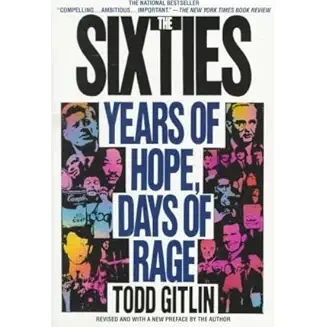PAID 112 Sections 14 & 22: Whitsitt (Spring 2025)
The Sixties
On this page
![journal icon [source:wikimedia commons]](https://upload.wikimedia.org/wikipedia/commons/thumb/b/b9/OOjs_UI_icon_journal-ltr.svg/1024px-OOjs_UI_icon_journal-ltr.svg.png) Secondary sources at a glance:
Secondary sources at a glance:
- Tips for evaluating secondary sources
- Selected books relevant to the 1960s
- Selected Preus Library databases with scholarly articles and other content
- Search the Preus Library catalog for books
Choosing Sources
 When choosing sources, consider:
When choosing sources, consider:
- Who
- Who wrote it? What could their biases and affiliations be?
- What
- What kind of source is it? A book? A newspaper article?
- What claims does the source make? What is its argument or thesis?
- Where
- Where was it published? In an encyclopedia? Online? What country?
- When
- When was it written? What time frame does it cover?
- Why
- Why did the author write it?
- Why might it be useful to my own argument or research questions?
Books of Note
-
 The Sixties: Years of Hope, Days of Rage
by
Todd Gitlin
Call Number: E841 .G57 1989 (also ebook)Publication Date: 1989Todd Gitlin, the highly regarded writer, media critic, and professor of sociology at the University of California, Berkeley, has written an authoritative and compelling account of this supercharged decade—a decade he helped shape as an early president of Students for a Democratic Society (SDS) and an organizer of the first national demonstration against the Vietnam war. Part critical history, part personal memoir, part celebration, and part meditation, this critically acclaimed work resurrects a generation on all its glory and tragedy.
The Sixties: Years of Hope, Days of Rage
by
Todd Gitlin
Call Number: E841 .G57 1989 (also ebook)Publication Date: 1989Todd Gitlin, the highly regarded writer, media critic, and professor of sociology at the University of California, Berkeley, has written an authoritative and compelling account of this supercharged decade—a decade he helped shape as an early president of Students for a Democratic Society (SDS) and an organizer of the first national demonstration against the Vietnam war. Part critical history, part personal memoir, part celebration, and part meditation, this critically acclaimed work resurrects a generation on all its glory and tragedy. -
The Year the Dream Died by Jules Witcover
Call Number: E846 .W55 1997Publication Date: 1997Month by month, Witcover re-creates 1968 as he travels with, and reports on, the political fortunes of Lyndon Johnson, Eugene McCarthy, Richard Nixon, Robert Kennedy, George Romney, and Hubert Humphrey. He conveys the actual words of national figures and commentary by rock artists, media people, economists, Vietnam veterans, and Haight-Ashbury hippies. -
America Divided by Maurice Isserman; Michael Kazin
Call Number: E841 .I87 2000 (also ebook)A history of the 1960s, discussing the social, cultural, and grassroots political movements that defined the decade, including the Vietnam War, the Cuban Missile Crisis, and the Civil Rights Movement; and providing information about some of the people who spurred the era of change. -
America in the Sixties by John Robert Greene
Call Number: EbookPublication Date: 2010-01-01In this book the author goes beyond the cliches and synthesizes thirty years of research, writing, and teaching on one of the most turbulent decades of the twentieth century. He sketches the well known players of the period, John F. Kennedy, Lyndon B. Johnson, Martin Luther King Jr., Malcolm X, and Betty Friedan, bringing each to life with subtle detail. He introduces the reader to lesser known incidents of the decade and offers fresh and persuasive insights on many of its watershed events.
Research Databases
-
America: History & Life (EBSCO) This link opens in a new window

Indexes scholarly journal articles, books, and dissertations in the history of U.S. and Canada from prehistory to the present.
-
Academic Search Elite (EBSCO) This link opens in a new window
 An excellent starting point for research across a broad stretch of academic subjects with thousands of full-text journals and abstracted and indexed journals. This database is sourced with PDF images for the great majority of journals; many of these PDFs are native (searchable) or scanned-in-color.
An excellent starting point for research across a broad stretch of academic subjects with thousands of full-text journals and abstracted and indexed journals. This database is sourced with PDF images for the great majority of journals; many of these PDFs are native (searchable) or scanned-in-color. -
JSTOR This link opens in a new windowA full-text collection of over 3,400 major scholarly journals and over 100,000 scholarly monographs. The digitized archive includes the first issue published for each journal (some are from 1665 to the present); but excludes the most recent 2 to 5 years for most journals.
-
Project Muse This link opens in a new windowFull text access is available to over 380 journals and over 13,000 scholarly books in the humanities and social sciences. Managed by the Johns Hopkins University Press. Coverage from 1993 - present.
Search WorldCat Discovery
The Perfect Source? Not Likely
Research isn't about finding that one perfect source that makes all the connections for you.
It's about pulling together information that helps you formulate your ideas and make the argument yourself. This video (2 minutes) explains why finding one perfect source isn't feasible, and describes some ways you can be strategic about your searching.
Video posted on YouTube by North Carolina State University Libraries under a Creative Commons 3.0 BY-NC-SA US license.
Ask Your Librarian
Get In Touch
- Last Updated: Oct 30, 2025 9:05 AM
- URL: https://guides.luther.edu/paid112-whitsitt
- Print Page
Content © Luther College Preus Library, 700 College Drive, Decorah, IA 52101 (563) 387-1166 

chat loading...

 When choosing sources, consider:
When choosing sources, consider:
